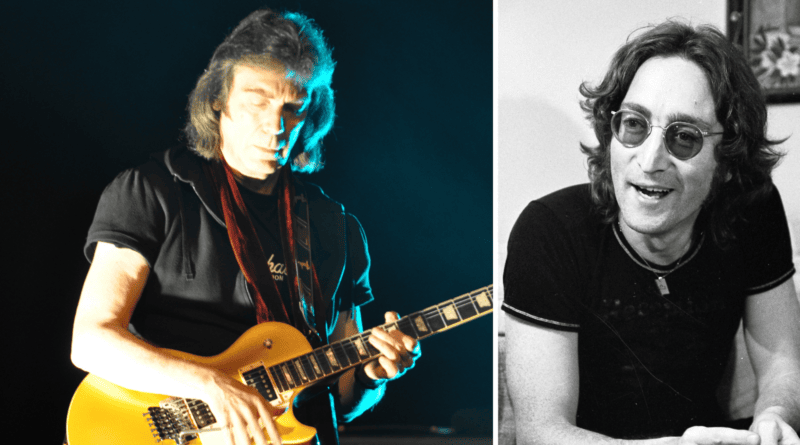Prog rock legend Steve Hackett recently looked back on how The Beatles’ John Lennon praised Genesis while they were still deeply into progressive rock. Speaking to Phil Aston in an interview, the guitar legend recalled Lennon’s words about his former band while discussing the band’s fourth studio album “Foxtrot.” “I’m very proud of it,” said Hackett, adding that he loves playing this stuff on tour again. He then explained what makes this record so special (transcribed by Killer Guitar Rigs):
“I think, as an album, it’s probably got the widest influences of just about anything I’ve ever heard. When you consider the first track is ‘Watcher of the Skies,’ where it conjures all sorts of stuff — spaceships, landings, crescendos, the drama of the uncountable time signatures, all of that, the whole sort of alien language of that…”
The record, as he adds, featured a variety of exciting fantasy-related topics, all which went hand-in-hand with the band’s specific flavor of progressive rock:
“See, you’ve got from sci-fi to the influence of early music with ‘Horizons’, where you’ve got the influence of Bach but the brevity from further back, with the music of William Byrd, ‘The Earle of Salisbury’ — a little piece that’s one minute and 30 seconds. So I devised ‘Horizons’ to be precisely that, just the idea [that] all we need is 90 seconds here.”
“So you’ve got the offensive — early music and science fiction — you’ve got the extremes there of what the band between us, or what we were capable of doing and writing together. And then there’s social comment too, there’s humor, there’s all sorts of stuff.”
And, according to Hackett, The Beatles legend was a fan of the band. In fact, as the guitarist adds, Lennon thought of them as the “true songs of The Beatles”:
“John Lennon very kindly said at one point that he considered us to be ‘true sons of The Beatles’. So there’s an interview with The Sun that I’ve been told about by a friend or two, and I’m very proud of that.”
“But if you think about the breadth of The Beatles’ stuff… yeah, I mean, their audience, their catchment was from three years old to 80 and beyond, I suspect, and that’s amazing. When you think of the traditions that they were drawing from — not just rock’n’roll, but Vaudeville, classical music, if you include, obviously, the work of [producer] George Martin, his stellar work with them — you’ve got so much, you’ve got the whole of music to draw from. It’s ‘The Laughing Policeman’ meets Gracie Fields meets Chuck Berry, and on.”
During the same chat, Steve Hackett also discussed some of his blues influences and how, at some point, he really fell into the blues boom of the 1960s and the early 1970s.
“I wanted to be a blues guitarist ever since I heard John Mayall with Eric Clapton, the Yardbirds with Jeff Beck, Peter Green, and all the people that I used to go and see in clubs with my tongue hanging out, thinking, ‘These guys are doing exactly what I want to be able to do.'”
However, as he further added, people around him felt like the whole blues boom was getting a little overdone and stale.
“And then we started doing something else,” explained Hackett. “What we think of as progressive now, it wasn’t that we were thinking that we were trying to come up with some original music, we weren’t thinking, ‘It’s gonna have a Hammond organ and a Mellotron in order to be authentic.'”
“We weren’t thinking like that. We were thinking, ‘Well, yeah, we can do something, which is getting on for half an hour long, in the case of ‘Supper’s Ready,’ or we can have a little single like ‘I Know What I Like.””
“And they can practically coexist on the same album. I think that’s the beauty of music — that if an audience is prepared to accept it, you can give them a wide range of ideas and have a number of writers in the same band.”
Another thing Hackett discussed was the gear he used for recording the “Foxtrot” album with Genesis. The record is now over five decades old, so it’s kind of exciting to look back into what kind of stuff was around back in the early 1970s:
“So, in those days, I had a couple of fuzz boxes, which I cherished daily at the time. It was usually either a Marshall SupaFuzz or a Colorsound — the Macari stuff — and then there was a Shaftesbury Duo Fuzz, which was rather thinner with more upper harmonic in it.”
“And sometimes, I used to use those in series — two fuzz boxes used in unison — and it didn’t produce a more fuzzy sound, what it produced was a more violin-like sound that I used it extensively on ‘The Lamb Lies Down on Broadway’, that sort of sound I was using on my first solo outing as well. So it was quite thin and piercing with a lot of upper harmonic in it.”
“The stuff that I recorded on ‘Foxtrot’ originally was on a tiny little amp, a Fender Champ. I’ve got a feeling when I listen back to stuff like ‘Blow by Blow’ with Jeff Beck — and he’s not here to confirm this or deny it, but I suspect it was a small amp being driven relatively hard.”
“But a Fender Champ was a little tiny thing. We would think of it like a practice amp now, but I used it extensively, and provided you’re feeding it with enough stuff, there’s no reason why you shouldn’t record with a little small practice amp — and with all the devices that are available these days, make it scream like hell and make it sound like you’re shaking the walls of the city, but you’re doing it in miniature.”
Photos: Tony Barnard (John Lennon, 1974), Clender (Steve Hackett – Parker Playhouse – 13662682353)


